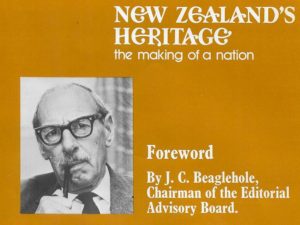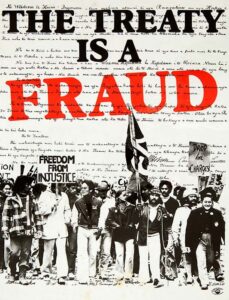1972: Ruth Ross Redux
May 19, 2023
By AHNZ

Typical of many left-wing white alpha females Ruth Ross was an accademic government bureaucrat and she had a special interest. Ross, years ahead of her time, was interested in Treaty of Waitangi revisionism which these days has become one of New Zealand’s major industries.
In 1953 Ross was given the plumb job by John Beaglehole to write an introduction for the re-publishing of the Declaration of Independence and the Treaty of Waitangi. Ross unpacked such a can of worms that she was rejected by her peers and her commission surrendered. The ‘personal crisis’ sent her out of her government job into domestic life as a wife and mother. Not until the election year of 1972 did Ross drop her bob again when a victorious Labour 3.0 picked it up and started running with it. Labour 4.0 even more so.
The nice clean fairytale of ‘The Treaty’ was not fit to be challenged in the 1950s consensus. However, the 1970s were a different era where identity and purpose and history and experimentation were on the agenda once again.
Sexism toward female intellectuals probably doesn’t sell books but it does get lots of boxes ticked when it comes to the grants required to publish one. Feminist audiences love it even though evidence tends to be scarce. Example offered in Attwood’s book to back it up is that, according to his own feelings, Beaglehole “never seemed” to encourage women to go to Cambridge as he did male scholars. Fiend!
 The other ‘battered woman fact’ is that Ross’ close friend, historian Mary Boyd, dismissed her “preoccupation” as a “waste of time.” Boyd, a woman, evidently standing in for the Patriarchy here to prove once again that a woman was treated mean so you should like/buy this book!
The other ‘battered woman fact’ is that Ross’ close friend, historian Mary Boyd, dismissed her “preoccupation” as a “waste of time.” Boyd, a woman, evidently standing in for the Patriarchy here to prove once again that a woman was treated mean so you should like/buy this book!
Besides the ‘battered woman’ line the book is apparently about the shambolic nature of ‘The Treaty’ in 1840. We might say that Ross found it “a simple nullity” just as Chief Justice Prendergast did in the 1870s (for which she is lauded and he is hated!) Typically, no menton made of the Kohimarama Rattification or the implications that successive Government has simply made up ‘The Treaty’ to suit their times. Ref. 1860: Kohimarama Conference, AHNZ
“To the current iteration of mainstream history the Treaty of Waitangi has become a constitutional document and used as a panacea for all sorts of political exploitation. Yet during most of our history it was recognised as a fraud or a legal nullity. ” – 1840: Hobson’s Treaty Refused, Blankets Thrown Back At Him, AHNZ
“Ripping off New Zealanders on behalf of Maori tribes is a prestigious line of work, with a long and glorious tradition. ” – 2002: Discovery of Lost Tribe, Ngati Hinerangi, AHNZ
“Kiwis have no idea when the Treaty of Waitangi was signed? It’s a bit like saying Jesus didn’t celebrate Christmas. But how could he? It was a retro-spective invention after his time. So was this.” – 1970s: Kiwis have no idea when the Treaty of Waitangi was signed, AHNZ
“However the interesting thing about this anniversary day that would startle the modern mind is that it was not at all set from the signing of the Treaty of Waitangi on 6 February.” – 1890: Celebration of the Colony’s Jubilee, AHNZ
 Attwood’s book is full of Statist assumptions about the good intentions of Hobson and Gipps that they were trying to be obedient to law and duty. Example, “If Hobson thought he was implementing the Colonial Office instructions, so did Gipps.” Anarchist History assumes no such benevolence on the part of our rulers! These politicians had games to play and hegemony to win. The priority was snookering the New Zealand Company Colonists so they could be controlled and taxed; Colonise the Colony! Turn them into human tax livestock! This was done by proclaimation with a Treaty as a spare support document. But to realise that you can’t think like a politician-worshipping Statist or you’ll simply have a black out!
Attwood’s book is full of Statist assumptions about the good intentions of Hobson and Gipps that they were trying to be obedient to law and duty. Example, “If Hobson thought he was implementing the Colonial Office instructions, so did Gipps.” Anarchist History assumes no such benevolence on the part of our rulers! These politicians had games to play and hegemony to win. The priority was snookering the New Zealand Company Colonists so they could be controlled and taxed; Colonise the Colony! Turn them into human tax livestock! This was done by proclaimation with a Treaty as a spare support document. But to realise that you can’t think like a politician-worshipping Statist or you’ll simply have a black out!
To try to study Treaty history from the point of view of ‘The Rule of Law’ or benevolent Statism is either a propaganda job or else leads to confusing inconsistencies as Ross discovered. Initially rebuked like someone libererated from Plato’s Cave come back to tell everyone they’re living in The Matrix, Ross’s work was lately redigested to build a new fairytale. If the old solid fairytale about ‘One People’ kept up then Maori activists would still be saying “The Treaty is a Fraud” as they did up to the 1970s. Thanks to the 1970s Ruth Redux successive governments have been able to launder loot and land in unspeakable quantities in the name of a newly re-defined “justice.”
Those making a mint off the Treaty of Waitangi Act (1975) which set up the Waitangi Tribunal or the State Owned Enterprises Act (1986) which demanded alliegance to (undefined and never heard of before) ‘Treaty Principles’ owe it to Ross. No to say that the Ross Redux was supposed to come to these ends or that it’s her fault. Ross really just opened up the unhealed wound so that others could re-miss-diagnose it and sew it up again for another few generations. Brian Attwood’s book is an essay on the stitching job.
—
Image ref. Geoffrey Perry, Wiki; AHNZ Mod
Ref. Are We Being Conned By The Treaty Industry?, AHNZ
4 thoughts on "1972: Ruth Ross Redux"
Leave a Reply
 Like Comment Share
Like Comment Share






I have a copy of Ruth Ross’ examination of the Waitangi document. [In] The New Zealand Journal of History; The University of Auckland; October 1972; Vol, 6 No.2 She declared the treaty was not really a treaty {Law since changed} and should be scrapped.
“However good intentions may have been, a close study of events show that the Treaty of Waitangi was hastily and inexpertly drawn up, ambiguous and contradictory in content, chaotic in execution. To persist in postulating that this was a ‘sacred compact’ is sheer hypocrisy”
Your final paragraph is confusing – as if Ross is to blame for the subsequent rorts and re-writes.
{I vaguely remember reading the original presentation to Victoria University. There was an extra piece, not in the Journal above, to do with explaining sovereignty. That if North Americans Indians could understand the concept, then so should Maori ~ which goes to the poor translation comment}
She opened up the can of worms and the situation today we owe to her but I wouldn’t use the word ‘blame’.
Here’s the text online. I think we’d be some of the few who read it these days…
https://www.nzjh.auckland.ac.nz/document.php?wid=1533
Have you read Peter Cresswell’s (NotPC blog) 9&10 Jan on Ned Fletcher’s the English text of ToW?
Thanks, no. I’ll check it out but I don’t have the book myself. Sounds like my jam.